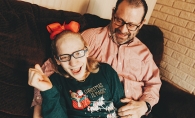
No one wants to anticipate the worst, but if the worst happens, the right kind of support is crucial. Sometimes family and friends are not enough. The Plymouth-based nonprofit Faith’s Lodge has introduced a new type of benefit program, Hope Works Here, to help workplaces support employees who are coping with the death of a child, or with the needs of a child with a medically complex condition.
“It was a benefit that we hoped to never use,” says Julie Cosgrove, senior vice president of human resources at Affinity Plus Federal Credit Union. “One of our core values as an organization is care, and when we imagined an employee going through such a catastrophic loss ... it made the partnership with Hope Works Here just an easier decision.” Affinity Plus was one of the first companies to sign up with Hope Works Here to offer this unique employee benefit, and one of the first to be in need of it. A benefit like Hope Works Here is one that many people might not even think of until tragedy strikes.
At Faith’s Lodge, executive director Kelly McDyre and her staff realized that grieving parents struggle with their return to work, and interactions with other employees is almost always difficult and awkward. Through conducting focus groups, McDyre found the same was true for the employee’s peer group. “Often, when employees return to work, employers and peers pretend nothing happened, thinking that if they talk about the loss it will make the employee sad. But the sadness is always there, just beneath the surface,” says McDyre.
At Affinity Plus, Cosgrove agrees. “Sometimes employees simply don’t know what to say,” she says. “They feel so bad, but they don’t know how to act or react, so they say nothing and they try to avoid the person.”
Faith’s Lodge took this research into account while creating Hope Works Here to holistically tackle this issue. The program provides a two-pronged approach in supporting a grieving employee. The first step is a meeting of the employee with a transition coach—a mental health professional specializing in child loss and illness—before the employee returns to work. Then the transition coach consults with the employee’s peer group, also before the return to work. When meeting with the peer group, the coach will give the group members the tools they can use to communicate with their grieving coworker based on the coworker’s own preferences. There is a third visit after the employee returns to work, and there is a follow up conversation with the employee and the employer a year after the loss. The second piece of the benefit is a certificate for the employee and their family to stay at Faith’s Lodge, where the employee can reflect in a safe space and connect with other people experiencing a similar loss.
About a dozen companies have added Hope Works Here as an employee benefit so far, with more expected to come onboard this year, says McDyre. Though the loss of a child is thankfully fairly rare, one in every 1,000 employees will experience it, and the right kind of support network is key to recovering. Hope Works Here aims to bring to the workplace more attention to and acknowledgment of parents’ grief.
“What needs is for [their grief] to be respected and acknowledged, and for the employer to give the employee the message, ‘We’ve got your back on this. When you’re ready to return back to work, we will help you,’” says McDyre. “It speaks volumes about an employer if they are willing to step in.” Taking that extra step could make all the difference.
Faith's Lodge
Facebook: Faith's Lodge
Twitter: @faithslodge
Instagram: @faithslodge









